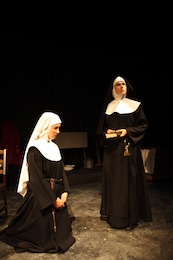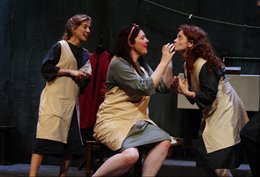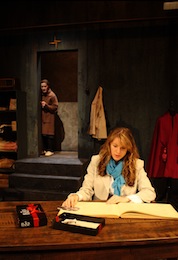“Eve started it all,” spits Mother Victoria (Caroline Lynch). No, she did not, and oh what a tiring tune that is. Eclipsed shows an audience, in a haunting way, the drastic consequences of blind faith in laws which discriminate and punish, and how absolute power corrupts absolutely.
 Mephisto Theatre Company’s production of Patricia Burke Brogan’s play at the Town Hall Theatre in Galway, directed by Niall Cleary, is a beautifully paced and poignant event that tells of the histories and experiences of women (unmarried mothers, orphans, those ‘mentally unfit’ but ‘fit for work’) in Ireland’s Magdalene laundries. It leads the audience from recognition of an institution, to in-jokes about a culture, and, finally, at the performance I attended, to tears about a tragic history that is still not fully unearthed. Thus, the play does not end on stage, but follows an audience out the door, prompting them to further action.
Mephisto Theatre Company’s production of Patricia Burke Brogan’s play at the Town Hall Theatre in Galway, directed by Niall Cleary, is a beautifully paced and poignant event that tells of the histories and experiences of women (unmarried mothers, orphans, those ‘mentally unfit’ but ‘fit for work’) in Ireland’s Magdalene laundries. It leads the audience from recognition of an institution, to in-jokes about a culture, and, finally, at the performance I attended, to tears about a tragic history that is still not fully unearthed. Thus, the play does not end on stage, but follows an audience out the door, prompting them to further action.
Triona Lillis’s set is immersed in the colours and fine textures of the Catholic Church. The crimson and white Carrickmacross lace of the bishops’ attire contrasts heavily with the faded walls, drab room and stifling uniforms donned by the penitent women, ensuring the sin of ‘vanity’ would not be an option they could indulge in. The set resembles a sweatshop or labour camp, where the weak are being exploited to benefit the whims of the privileged. The space on stage is the women’s prison, as they desperately try to glimpse the outdoors through use of a hand-mirror and multiple escape attempts. The outside world is conjured by them through sensory memories: the sun shining, roast beef dinners, going to dances. They need these memories and hopes, for inside their workroom remains only stale air, soap, water, Ireland’s ‘dirty linen’ (pun intended) and a reminder that their freedom and their babies are under the control of others.
 Interspersed throughout the two-act play are moments where the interior landscape of the tormented penitents and tormented Sister Virginia eclipse the naturalism of the laundry room. Virginia’s prayers, as she lays herself flat on the ground, physicalise her attempt to transcend the material world and connect with a higher presence. These shifts between the material and spiritual worlds are greatly enhanced by the eerie chimes and powerful interventions of Carl Kennedy's sound design. A bracing movement piece in the second act, where the women attack their cleaning duties, acquires a ritualistic energy as they bash and thwart their bodies against the floor, the walls, or any surface where they can physically release their suffering. Smack, smack, smack go the laundry boards they work, and the heaviness in their hearts.
Interspersed throughout the two-act play are moments where the interior landscape of the tormented penitents and tormented Sister Virginia eclipse the naturalism of the laundry room. Virginia’s prayers, as she lays herself flat on the ground, physicalise her attempt to transcend the material world and connect with a higher presence. These shifts between the material and spiritual worlds are greatly enhanced by the eerie chimes and powerful interventions of Carl Kennedy's sound design. A bracing movement piece in the second act, where the women attack their cleaning duties, acquires a ritualistic energy as they bash and thwart their bodies against the floor, the walls, or any surface where they can physically release their suffering. Smack, smack, smack go the laundry boards they work, and the heaviness in their hearts.
Strong and complementary performances by all the performers signalled this was a play and a history they had invested in personally as well as professionally. When they cried for their lost freedoms and lost babies, the agony of their incarceration was palpable. Exceptional performances by Emma O’Grady (Brigit) and Catherine Denning (Virginia) exploited Burke Brogan’s nuanced dramatic text, highlighting the complexities inherent in Magdalene history. Sister Virginia wants to believe she is offering a haven to women with nowhere else to go, protecting them and providing spiritual guidance. But, as Brigit repeatedly demands, “the keys, Sister”. This is a battle between the outside world and the inside, between organised religion and spirituality, and between public politics and personal morality.
 Thankfully, Eclipsed offers the audience some relief near the end, as Sister Virginia hands over the keys to Brigit. Without hesitation she runs off stage, through the seating bank, and out the door to reclaim her life. Sadly though, as her child Rosa comes looking for her from the U.S. decades later, we can assume she did not find her daughter.
Thankfully, Eclipsed offers the audience some relief near the end, as Sister Virginia hands over the keys to Brigit. Without hesitation she runs off stage, through the seating bank, and out the door to reclaim her life. Sadly though, as her child Rosa comes looking for her from the U.S. decades later, we can assume she did not find her daughter.
Cleary’s production potently conveys the rotten distinctions between various factions of society, where there is one rule for the Princes of the Church and the fellas in the dance hall, and another for these women. Plays, poetry, films and artwork exposed and confronted Magdalene history in Ireland long before the United Nations Committee against Torture made its recommendations to the Irish state in 2011 for an inquiry, to which the state attempted to deny complicity. First produced by Punchbag in Galway in 1992, Eclipsed presents the tragedies and complexities of the penitents’ experiences, but also points to the histories of the orphaned/adopted/exported children, the hypocrisies of religion, politics and society throughout twentieth-century Ireland – and the failure of contemporary society to express sufficient anger at these crimes against humanity. Where are the protest marches for these women? Where are the mass graves they lie in, unmarked and uncared for?
The ghosts of this history haunt more than the stage, as Cleary’s production points out through two performers, a Magdalene and her child, leaving the stage and passing the audience, implicating our presence with the responsibility of bearing witness. Eclipsed, like Magdalene history, will continue to haunt this country, on all its stages, until society gives voice to it in a manner fitting the gravity of its injustice.
Miriam Haughton is a researcher at The Creative Exchange Lab at the University of Ulster, an AHRC project in partnership with Queen's University Belfast.